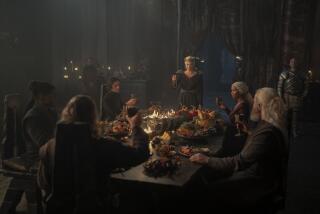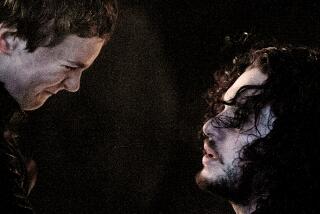Column: ‘Game of Thrones’ will end, but respect for fantasy should not
As “Game of Thrones” prepares to end, there will be an accounting. Of the dead and the living, of the weapons they carried and the colors they wore, of alliances broken, betrayed and forged. There will be catalogs of magical creatures, of characters with special powers, of prophetic words and curses, holy trees and ancient scripts, a list of houses, sigils and words (not to mention the Oreos that represent them).
Within the story and among its audience, these things will be pored over and repeated, totems of knowledge, anticipation, reassurance. When the story is done, we will argue about meaning and justice and fate, about who was the bravest, the vilest, the best loved, the most tragic figure in the tale.
But with any luck, we won’t forget that “Game of Thrones” is a fantasy and this is what fantasy looks like, what fantasy does.
With any luck we won’t go back to square freaking one in which emerging epics are dismissed as “swords ’n’ sorcery” and any story that contains a wizard or a speaking tree is instantly considered less meaningful than, say, one more period drama about the British monarchy or another grisly true-crime documentary series.
But we probably will. Hollywood likes to forget things it knows — Women are funny! Non-white leads sell tickets! Audiences like musicals! — and fantasy is out of favor more often than not.
Something there is that doesn’t love a Wall.
Fantasy fans have been fighting this battle for years. It seems like only yesterday that I was being told by people who claimed to know that New Line would most likely collapse when only a few nerdy Tolkien fans showed up for “The Fellowship of the Ring.” Or that the “Harry Potter” films would do better, but they would not be important movies, like the inevitable litter of Oscar-season biopics and broody dramas about ambivalent men. (A bizarre opinion shared, unfortunately by the film academy, which gave the eight-part “Harry Potter” franchise exactly zero Oscar nominations.)
Not only did those two franchises thrive, they lifted fantasy out of cinematic dry dock, making it possible for “Game of Thrones” and a new crop of television fantasies to exist. But still any story in which magic is not defined as a super-power must fight to be taken seriously. It may seem like “Game of Thrones” has ruled forever, but in the beginning, only a few of us saw the hit it would become. Others just saw those swords ’n’ that sorcery.
Even Nobel Prize winner Kazuo Ishiguro could not avoid the wrath of the New Yorker for the “Arthurian chain mail” of “The Buried Giant”; other publications simply asked other fantasy writers to review the book, which is set in a mythical ancient England, as if the language was understandable only to those who spoke it.
As if fantasy weren’t the oldest form of storytelling.
“That we’re still cordoning it off as a subgenre is bizarre and perverse,” says Lev Grossman, author of “The Magicians” trilogy. “Literature is based on fantasy; the Western obsession with realism didn’t start until the 18th century. Everything before that was gods and monsters, witches and ghosts.”
Grossman, who reviewed “The Buried Giant” for Time, is a former book critic and tech writer; he is also working on a retelling of the Arthurian tale in part because he wants to see how what may be the best-known fantasy tale holds up as the genre has changed in its struggle to survive.
“Now people want to make fantasy play by real-world rules,” he says. “I hear a lot of requests for ‘grounded fantasy,’ which uses the tools of realism — the world is grimy, people swear.”
But while fantasy requires immersion, or world building, it has never been about escape, at least not in the larger sense of the word. Just as science fiction gives us a way to express anxiety over an increasing dependence on technology, fantasy epics deal in, well, epic concerns — fate and faith, power and progress, sacrifice and betrayal, the importance of the individual and the collective.
“Fantasy can say that metaphors are real, and you gotta deal with them,” says John Clute, co-editor of “The Encyclopedia of Fantasy” and “The Encyclopedia of Science Fiction.” “Good, evil, God, Armageddon, rites of passage. We love swords because we can imagine ourselves swinging them. They are hand to hand; your fate is co-extensive with what you can see.”
For some, the Marvel universe fills the need for epic, but superhero stories are not true fantasies; they rely too much on gadgetry and do not deal in large enough themes.
“Superhero dramas coat science fiction premises in fantasy plots,” Clute says, “but they are so overloaded with wish fulfillment for children it is hard to think about them.”
In fantasy, magic may exist but it is part of the natural world; technology, with all its space-traveling, power-endowing possibilities, isn’t just beside the point, it’s the counterpoint.
RELATED: Why does George R.R. Martin love killing off characters? Blame J.R.R. Tolkien »
In a lovely turn of fate, or poetic justice, the long-awaited biopic “Tolkien” premieres less than a month after “Game of Thrones” ends. Focusing on the early life of J.R.R., “Tolkien” illuminates the very real forces — early loss, long-thwarted love, powerful friendship and the horror of WWI — that became the basis for one of literature’s greatest fantasies. A scholar of Old and Middle English, Tolkien understood the power of myth and wanted to create one that pushed past the Arthurian tale.
The need to understand the essential realities of two world wars and an industrial revolution fuel “The Lord of the Rings” far more than a desire to escape to a land of elves and Ents. Itself imbued with elements of fantasy, “Tolkien” is a quietly heroic chronicle of how and why that happened.
“Tolkien and [C.S.] Lewis were haunted by the industrial revolution,” says Grossman, “and they used fantasy to mourn what they had lost.”
“A lot of fantasy is about reconnecting with nature, with people in a real way,” he adds. “Unimpeded by technology, the characters are very present in their world, they understand how it works, they deal with each other face to face, and they’re not afraid of big emotions.”
And that may be the real reason fantasy struggles to be taken seriously in Hollywood — because it takes emotions seriously. Fantasy is not about snark; it’s about sincerity. Love and honor, friendship and revenge, the corruptive nature of power, the significance of the small acts of mercy. In fantasy, history matters, oaths should not be made lightly, mistakes have consequences and help often comes from the least likely source.
Human drama, in other words. The dragons and dire wolves just make it a bit more fun.
‘Game of Thrones’
Where: HBO
When: 9 p.m. April 14
Rated: TV-MA (may be unsuitable for children under 17)
More to Read
The biggest entertainment stories
Get our big stories about Hollywood, film, television, music, arts, culture and more right in your inbox as soon as they publish.
You may occasionally receive promotional content from the Los Angeles Times.











